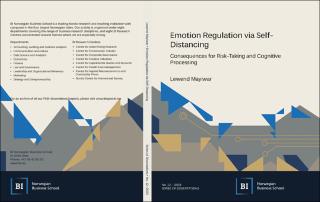| dc.contributor.author | Mayiwar, Lewend | |
| dc.date.accessioned | 2024-03-18T14:20:41Z | |
| dc.date.available | 2024-03-18T14:20:41Z | |
| dc.date.created | 2023-09-27T13:14:16Z | |
| dc.date.issued | 2023 | |
| dc.identifier.isbn | 978-82-8247-339-2 | |
| dc.identifier.uri | https://hdl.handle.net/11250/3122939 | |
| dc.description.abstract | Emotions often carry relevant information that guides decisions, particularly in ambiguous situations. However, without proper regulation, emotions can become a source of unwanted bias. The current dissertation examines how emotion regulation influences decision-making under risk and uncertainty while also specifying the cognitive-processing mechanisms. Three preregistered empirical papers demonstrate how emotion regulation via self-distancing reduces emotional influences in decision-making under risk and uncertainty through changes in cognitive processing. Overall, the findings suggest that decision-makers who reflect on emotional problems from a more psychologically distant perspective rely less on their gut feelings and instead process information more analytically. These changes in cognitive processing, in turn, lead to downstream consequences for decision-makers’ risk-taking. | |
| dc.language.iso | eng | |
| dc.publisher | BI Norwegian Business School | |
| dc.relation.ispartof | Series of Dissertations | |
| dc.relation.ispartofseries | Series of Dissertations | |
| dc.title | Emotion Regulation via Self- Distancing. Consequences for Risk-Taking and Cognitive Processing. | |
| dc.title.alternative | Emotion Regulation via Self- Distancing. Consequences for Risk-Taking and Cognitive Processing. | |
| dc.type | Doctoral thesis | |
| dc.description.version | publishedVersion | |
| dc.source.pagenumber | 167 | |
| dc.source.volume | 2023 | |
| dc.source.issue | 12 | |
| dc.identifier.cristin | 2179418 | |
| cristin.ispublished | true | |
| cristin.fulltext | original | |
